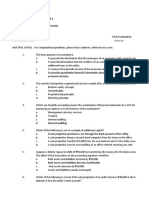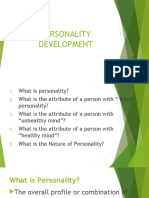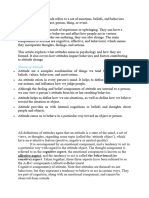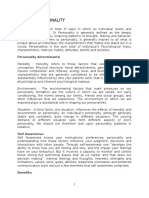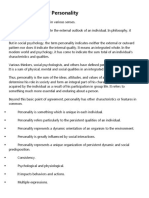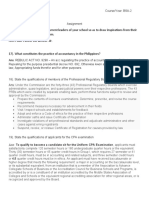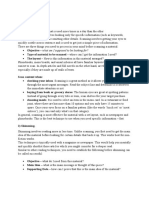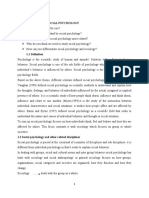0 ratings0% found this document useful (0 votes)
67 viewsModule 1
The document discusses factors that influence individual behavior such as cultural, social, psychological, and personal factors. It also examines how personality, values, and individual differences impact how people respond to their environment. Motivation is discussed as the desire within a person that causes them to act and is often tied to personal or external goals.
Uploaded by
Danilo Diniay JrCopyright
© © All Rights Reserved
Available Formats
Download as DOCX, PDF, TXT or read online on Scribd
0 ratings0% found this document useful (0 votes)
67 viewsModule 1
The document discusses factors that influence individual behavior such as cultural, social, psychological, and personal factors. It also examines how personality, values, and individual differences impact how people respond to their environment. Motivation is discussed as the desire within a person that causes them to act and is often tied to personal or external goals.
Uploaded by
Danilo Diniay JrCopyright
© © All Rights Reserved
Available Formats
Download as DOCX, PDF, TXT or read online on Scribd
You are on page 1/ 4
Name: Danilo Q. Diniay Jr.
BSA – 3
Activity 1
1. What are the factors that influence individual behavior?
By definition Individual behavior can be defined as a mix of
responses to external and internal stimuli. It is the way a person
reacts in different situations and the way someone expresses
different emotions like anger, happiness, love, etc. So basically the
factors that can influence individual behavior must come from
external factors like sociological, cultural, etc. or come from the
external factor like personal, psychological, etc. factors.
2. What factors can affect behavior?
Behavior is the way in which one acts or conducts oneself,
especially towards others. Based on my research, these are some of
the factors that can affect behavior: The cultural factor, Psychological
factors, social factors and personal factors. Cultural factors is a
collective programming of the mind that distinguishes the members of
one group or category of people from others and culture is a set of
beliefs, values and practices that are shared by most people within a
relatively large group. Culture is passed on from one group member
to another; from one generation to the next. Psychological factors,
these are the motivation – a need that urges a person to act, a
perception – refers to the selection, organization and interpretation of
information in a way the produces a meaningful experience of the
world, and Learning – this highlights the importance of past
experience. Social Factors, we always seek confirmation from the
people around us and seldom do things that are not socially
accepted. And the Personal factor, this might be the age, stage of life
cycle, occupation, economic circumstances, lifestyle, personally
traits, and self-concept.
Assignment
Personality, Values, and Individual
Differences
Personality is an area of study that deals with complex human
behavior, including emotions, actions, and cognitive process. So
personality is the inner psychological characteristics that determine and
reflect how a person responds to his or her environment. It reflects
individual differences, consistent in a sense that personality doesn’t change
easily or doesn’t change in a short period of time, most of the time if you
face the same situation then you’re might reacts the same way and that’s
what I meant on consistent, but personality can change this regard to the
major changes in your life to the point that your personality changes, for
example acquiring a new job that you’ve dreamed for, this leads you to
react to be more productive because this is your dream job and you do
anything to excel. Therefore personality can be a hereditary characteristics
and childhood experiences some also are environmental influences on the
person concerned.
Values are individual beliefs that motivate people to act one way or
another, these serve as a guide to a human being. Generally, people are
influence and adopt the values that they are raised with. People also tend
to believe that those values are “right” because they are the values of their
particular culture. So, whether values are sacred or have intrinsic worth,
values vary among individuals and across cultures and time. However,
values are universally recognized as a driving for in our ethical decision
making.
Individual Differences are unique characteristics of individuals that
have an impact on how they learn. Based on my research these are the
type of individual differences: Learning style, Aptitude, personality and
emotional intelligence. And also there are 5 main causes of individual
differences: Race, Sex, Heredity, Maturity, and social and economic status.
Therefore individual differences may be physical, psychological, and
emotional, the individual differences that characterize a specific person
makes that person unique. Relating to organization, one person may be
dissatisfied, withdrawn, and negative in one job setting but satisfied, outing
and positive in another – working conditions, co-workers, and leadership
are just a few factors that affect how a person perform and feels about
his/her job. Thus whenever a manager attempts to assess or account for
individual differences among her employees, he/she must also consider the
situation in which behavior occurs. In this situation, understanding
differences across people and creating effective psychological contracts
can help the manager facilitate a good fit between people and the
organization
Attitudes, Perceptions and Emotions
Perception is the set of processes by which an individual becomes
aware of and interprets information about the environment. If everyone
perceive everything the same way things would be a lot simpler of course
just the opposite is true people perceive very different ways. Moreover,
people often assume that reality is objective and that we all perceive the
same things in the same way
Attitude, by definition it is a settled way of thinking or feeling about
someone or something, typically one that is reflected in a person’s
behavior. For me Attitude is mental energy that from the moment you
awaken until you fall asleep at night, we are continually generating this
energy or attitude. Attitude is only divided into two, the positive attitude and
the negative and there no such thing as neutral attitude. It is an attraction
because when you’re in a positive attitude, no matter how hard your day or
bad your day, you can still look for the positive moment and sleep at peace
and that is how the energy powerful is.
Employees who effectively manage their emotions and moods can
create a competitive advantage for a company in relating to organization.
Our emotions are not guided solely by conscious or rational thought,
emotions often plays a larger role in our behaviors than does conscious
reasoning. By definition, Emotions are intense, short-term physiological,
behavioral, and psychological reactions that prepare us to respond.
Motivation
In relation to organization, Performance depends on the effort these
employees put into work, their ability, and employer support. Effort is in a
part determined by motivation. Motivation is the desire that exists within a
person that causes that individual to act. People usually act for a number of
reasons, but they are often tied to goals that have been set by themselves
or by others around them. Thus, motivation is a goal-directed drive.
Motivators account for increases in motivation because of enrichment and
positive work characteristics some example of this motivators are
achievement, recognition, work itself, responsibility and advancement.
You might also like
- Is The Recording Function of The Accounting Process100% (5)Is The Recording Function of The Accounting Process2 pages
- Notes - Personality and Career Management - Unit 1 & 2No ratings yetNotes - Personality and Career Management - Unit 1 & 210 pages
- 1st 2nd Lecture Human Behavior of OrganizationNo ratings yet1st 2nd Lecture Human Behavior of Organization9 pages
- Personality and Personality DevelopmentNo ratings yetPersonality and Personality Development126 pages
- Attitude: MD Mosharrof Hossain ChowdhuryNo ratings yetAttitude: MD Mosharrof Hossain Chowdhury12 pages
- 2 Foundation of Individual Behavior and Learning in An OrganizationNo ratings yet2 Foundation of Individual Behavior and Learning in An Organization47 pages
- A Study On Employee Attitude On Presidency Kid Leather LimitedNo ratings yetA Study On Employee Attitude On Presidency Kid Leather Limited81 pages
- Differences - That Is, The Range of Different Styles of Thinking, Feeling and Acting. Just As HumanNo ratings yetDifferences - That Is, The Range of Different Styles of Thinking, Feeling and Acting. Just As Human4 pages
- 2 Foundation of Individual Behavior and Learning in An OrganizationNo ratings yet2 Foundation of Individual Behavior and Learning in An Organization47 pages
- There Are Some Factors That Affect The Human BehaviorNo ratings yetThere Are Some Factors That Affect The Human Behavior2 pages
- Personality: Meaning, Nature, Determinants and Approaches100% (2)Personality: Meaning, Nature, Determinants and Approaches5 pages
- Group-2 PPT - CBMR, Bba Llb-II B-2 (2021-2022)No ratings yetGroup-2 PPT - CBMR, Bba Llb-II B-2 (2021-2022)7 pages
- Individual behaviour – causes – Environmental Ef... - Google DocsNo ratings yetIndividual behaviour – causes – Environmental Ef... - Google Docs2 pages
- Module 4 PERSONALITY ATTITUDES AND BEHAVIORNo ratings yetModule 4 PERSONALITY ATTITUDES AND BEHAVIOR7 pages
- Unit 4: Introduction To Personality & Personality DevelopmentNo ratings yetUnit 4: Introduction To Personality & Personality Development56 pages
- Characteristics of Organizational BehaviorNo ratings yetCharacteristics of Organizational Behavior5 pages
- Name: Danilo Q. Diniay Jr. BSA-2 Schedule: WTH (5:15-6:45)No ratings yetName: Danilo Q. Diniay Jr. BSA-2 Schedule: WTH (5:15-6:45)2 pages
- Name: Danilo Q. Diniay Jr. BSA-2 1. Nationalism Was A Potent Force in The 19 Century World of RizalNo ratings yetName: Danilo Q. Diniay Jr. BSA-2 1. Nationalism Was A Potent Force in The 19 Century World of Rizal1 page
- Char Acte Risti Cs of Orga Nizat Ional Behav IORNo ratings yetChar Acte Risti Cs of Orga Nizat Ional Behav IOR4 pages
- TSLB3093 Language Arts in The Primary ESL ClassroomNo ratings yetTSLB3093 Language Arts in The Primary ESL Classroom8 pages
- Gingoog City Colleges - Junior High School: Chapter 2-Review of The Related LiteratureNo ratings yetGingoog City Colleges - Junior High School: Chapter 2-Review of The Related Literature7 pages
- Test Bank Looking Out Looking in 14th EditionNo ratings yetTest Bank Looking Out Looking in 14th Edition5 pages
- Childs Language Acquisition PresentationNo ratings yetChilds Language Acquisition Presentation11 pages
- Entrepreneurship OUM: OUMM 2103 Topic 3: Dr. Azahari Jamaludin Email: Bjazahari@oum - Edu.my100% (1)Entrepreneurship OUM: OUMM 2103 Topic 3: Dr. Azahari Jamaludin Email: Bjazahari@oum - Edu.my25 pages
- Introduction To Social Psychology - For MergeNo ratings yetIntroduction To Social Psychology - For Merge58 pages
- Is The Recording Function of The Accounting ProcessIs The Recording Function of The Accounting Process
- Notes - Personality and Career Management - Unit 1 & 2Notes - Personality and Career Management - Unit 1 & 2
- 2 Foundation of Individual Behavior and Learning in An Organization2 Foundation of Individual Behavior and Learning in An Organization
- A Study On Employee Attitude On Presidency Kid Leather LimitedA Study On Employee Attitude On Presidency Kid Leather Limited
- Differences - That Is, The Range of Different Styles of Thinking, Feeling and Acting. Just As HumanDifferences - That Is, The Range of Different Styles of Thinking, Feeling and Acting. Just As Human
- 2 Foundation of Individual Behavior and Learning in An Organization2 Foundation of Individual Behavior and Learning in An Organization
- There Are Some Factors That Affect The Human BehaviorThere Are Some Factors That Affect The Human Behavior
- Personality: Meaning, Nature, Determinants and ApproachesPersonality: Meaning, Nature, Determinants and Approaches
- Individual behaviour – causes – Environmental Ef... - Google DocsIndividual behaviour – causes – Environmental Ef... - Google Docs
- Unit 4: Introduction To Personality & Personality DevelopmentUnit 4: Introduction To Personality & Personality Development
- The Psychology Code: Unlocking Human BehaviorFrom EverandThe Psychology Code: Unlocking Human Behavior
- Name: Danilo Q. Diniay Jr. BSA-2 Schedule: WTH (5:15-6:45)Name: Danilo Q. Diniay Jr. BSA-2 Schedule: WTH (5:15-6:45)
- Name: Danilo Q. Diniay Jr. BSA-2 1. Nationalism Was A Potent Force in The 19 Century World of RizalName: Danilo Q. Diniay Jr. BSA-2 1. Nationalism Was A Potent Force in The 19 Century World of Rizal
- TSLB3093 Language Arts in The Primary ESL ClassroomTSLB3093 Language Arts in The Primary ESL Classroom
- Gingoog City Colleges - Junior High School: Chapter 2-Review of The Related LiteratureGingoog City Colleges - Junior High School: Chapter 2-Review of The Related Literature
- Entrepreneurship OUM: OUMM 2103 Topic 3: Dr. Azahari Jamaludin Email: Bjazahari@oum - Edu.myEntrepreneurship OUM: OUMM 2103 Topic 3: Dr. Azahari Jamaludin Email: Bjazahari@oum - Edu.my




